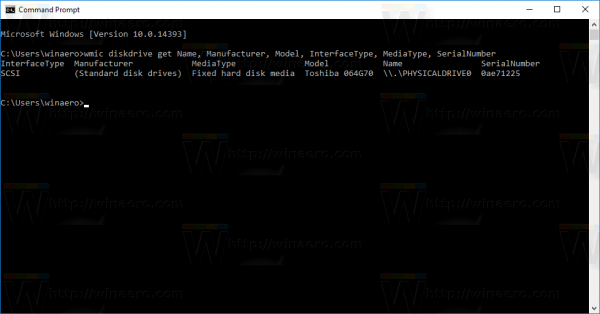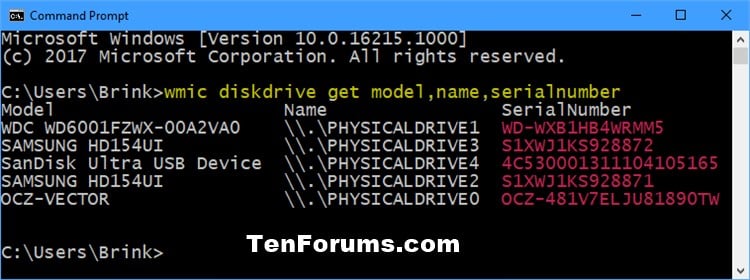-->
- To find Hard Disk Serial Number in Windows 10, do the following. Open an elevated command prompt. Type or copy-paste the following command: wmic diskdrive get Name, Manufacturer, Model, InterfaceType, MediaType, SerialNumber. In the output, you'll see the model, name, and serial number listed for.
- Dec 08, 2018 In Windows 10, using the command line, you can view the serial number of the hard disk installed on your PC. If you need to write down the serial number or just view the hard disk information without disassembling the computer, this can be done with a single command. The serial number is a unique number assigned to the hardware by its manufacturer.
- Its very simple to find out the serial Number of Hard Drive in Windows 10. Just follow these steps: Press Win+R Type cmd and press enter. Enter this command - wmic diskdrive get serialnumber Press.
Get disk drive information in Windows 10 with this command Sometimes you need to quickly find the interface through which your storage is connected inside your PC, and its serial number and a set of other properties. Windows Forms General https. So when the user installs my application i'll collect his Hard Disk Serial Number and store it in the server. The next time user attempts to install it again in another computer that should be avoided. Thanks, Thursday, June 15, 2006 3:10 PM.
Syntax
Description
Disk Serial Number Windows 10
The Get-PhysicalDisk cmdlet gets a list of all PhysicalDisk objects visible across any available Storage Management Providers, or optionally a filtered list of disks.
Examples
Example 1: Getting all physical disks
This example returns an array of all PhysicalDisk objects present in the computer.A storage management provider is required to manage physical disks.
Example 2: Getting all physical disks eligible for adding to a storage pool
This example returns an array of PhysicalDisk objects that are available for adding to a storage pool (they are in a primordial pool).
Parameters
Indicates that this cmdlet gets physical disks that are available for use in a storage pool.
| Type: | Boolean |
| Position: | Named |
| Default value: | None |
| Accept pipeline input: | False |
| Accept wildcard characters: | False |
Runs the cmdlet in a remote session or on a remote computer.Enter a computer name or a session object, such as the output of a New-CimSession or Get-CimSession cmdlet.The default is the current session on the local computer.
| Type: | CimSession |
| Position: | Named |
| Default value: | None |
| Accept pipeline input: | False |
| Accept wildcard characters: | False |
Specifies a description.The cmdlet gets the physical disks that contain the description.You can use wildcard characters to enter a description pattern.
| Type: | String |
| Position: | Named |
| Default value: | None |
| Accept pipeline input: | False |
| Accept wildcard characters: | False |

Gets the physical disk with the specified friendly name.Enter a friendly name, or use wildcard characters to enter a name pattern.
| Type: | String |
| Position: | 0 |
| Default value: | None |
| Accept pipeline input: | True (ByValue) |
| Accept wildcard characters: | False |
Indicates whether the cmdlet gets a list of physical disks that host the extents of the virtual disk that you specify by using the VirtualDisk parameter.
| Type: | Boolean |
| Position: | Named |
| Default value: | None |
| Accept pipeline input: | False |
| Accept wildcard characters: | False |
Specifies the health status of physical disks.The acceptable values for this parameter are:
- Healthy
- Unhealthy
- Unknown
- Warning
| Type: | PhysicalDiskHealthStatus |
| Accepted values: | Healthy, Warning, Unhealthy, Unknown |
| Position: | Named |
| Default value: | None |
| Accept pipeline input: | False |
| Accept wildcard characters: | False |
Specifies the input object that is used in a pipeline command.
| Type: | CimInstance |
| Position: | Named |
| Default value: | None |
| Accept pipeline input: | True (ByValue) |
| Accept wildcard characters: | False |
Specifies a manufacturer.The cmdlet gets the physical disks that match the value.You can use wildcard characters to enter a pattern.
| Type: | String |
| Position: | Named |
| Default value: | None |
| Accept pipeline input: | False |
| Accept wildcard characters: | False |
Specifies a model.The cmdlet gets the physical disks that match the value.You can use wildcard characters to enter a pattern.

| Type: | String |
| Position: | Named |
| Default value: | None |
| Accept pipeline input: | False |
| Accept wildcard characters: | False |
Indicates that this cmdlet gets physical disks that contain the last remaining copy of the data of a virtual disk.
| Type: | SwitchParameter |
| Position: | Named |
| Default value: | None |
| Accept pipeline input: | False |
| Accept wildcard characters: | False |
Specifies the ID of the physical disk to get.
| Type: | String |
| Aliases: | PhysicalDiskObjectId |
| Position: | Named |
| Default value: | None |
| Accept pipeline input: | True (ByValue) |
| Accept wildcard characters: | False |
Windows 10 Get Disk Serial Number Download
Indicates that this cmdlet gets physical disks that are physically connected to the specified storage node.
| Type: | SwitchParameter |
| Position: | Named |
| Default value: | None |
| Accept pipeline input: | False |
| Accept wildcard characters: | False |
Indicates whether the cmdlet gets a list of physical disks to host the extents that belong to the virtual disk specified by the VirtualDisk parameter.Specify the physical disks to host the extents of a virtual disk by using the PhysicalDisksToUse parameter of the New-VirtualDisk cmdlet.
| Type: | Boolean |
| Position: | Named |
| Default value: | None |
| Accept pipeline input: | False |
| Accept wildcard characters: | False |
Specifies the serial number of the physical disk to get.
| Type: | String |
| Position: | 1 |
| Default value: | None |
| Accept pipeline input: | True (ByValue) |
| Accept wildcard characters: | False |
Specifies a storage enclosure associated with the physical disk that this cmdlet gets.To obtain a StorageEnclosure object, use the Get-StorageEnclosure cmdlet.
| Type: | CimInstance |
| Position: | Named |
| Default value: | None |
| Accept pipeline input: | True (ByValue) |
| Accept wildcard characters: | False |
Specifies a storage node as a CimInstance object.The cmdlet gets the physical disk connected to the node that you specify.To obtain a storage node object, use the Get-StorageNode cmdlet.
| Type: | CimInstance |
| Position: | Named |
| Default value: | None |
| Accept pipeline input: | True (ByValue) |
| Accept wildcard characters: | False |
Accepts a StoragePool object as input and gets the physical disks that belong to the pool.The Storage Pool CIM object is exposed by the Get-StoragePool cmdlet.
| Type: | CimInstance |
| Position: | Named |
| Default value: | None |
| Accept pipeline input: | True (ByValue) |
| Accept wildcard characters: | False |
Specifies a storage subsystem.This cmdlet gets physical disks attached to the storage subsystem that you specify.To obtain a StorageSubsystem object, use the Get-StorageSubSystem cmdlet.
| Type: | CimInstance |
| Position: | Named |
| Default value: | None |
| Accept pipeline input: | True (ByValue) |
| Accept wildcard characters: | False |
Gets only the physical disks with the specified IDs.Type one or more IDs (separated by commas), or use wildcard characters to enter a pattern.
| Type: | String |
| Aliases: | Id |
| Position: | Named |
| Default value: | None |
| Accept pipeline input: | True (ByValue) |
| Accept wildcard characters: | False |
Specifies an allocation method or usage.This cmdlet gets the physical disks that have the specified allocation method.The acceptable values for this parameter are:
- AutoSelect
- HotSpare
- Journal
- ManualSelect
- Retired
- Unknown
| Type: | PhysicalDiskUsage |
| Accepted values: | Unknown, AutoSelect, ManualSelect, HotSpare, Retired, Journal |
| Position: | Named |
| Default value: | None |
| Accept pipeline input: | False |
| Accept wildcard characters: | False |
Accepts a VirtualDisk object as input and gets the physical disks used by the virtual disk.The VirtualDisk object is exposed by the Get-VirtualDisk cmdlet.
| Type: | CimInstance |
| Position: | Named |
| Default value: | None |
| Accept pipeline input: | True (ByValue) |
| Accept wildcard characters: | False |
This parameter is reserved for future use.
| Type: | UInt64 |
| Position: | Named |
| Default value: | None |
| Accept pipeline input: | False |
| Accept wildcard characters: | False |
This parameter is reserved for future use.
| Type: | UInt64 |
| Position: | Named |
| Default value: | None |
| Accept pipeline input: | False |
| Accept wildcard characters: | False |
Inputs
Microsoft.Management.Infrastructure.CimInstance#ROOT/Microsoft/Windows/Storage/MSFT_StoragePool
You can use the pipeline operator to pass an MSFT_StoragePool object to the StoragePool parameter.
Microsoft.Management.Infrastructure.CimInstance#ROOT/Microsoft/Windows/Storage/MSFT_StorageSubsystem
You can use the pipeline operator to pass an MSFT_StorageSubsystem object to the StorageSubsystem parameter.
Microsoft.Management.Infrastructure.CimInstance#ROOT/Microsoft/Windows/Storage/MSFT_VirtualDisk
You can use the pipeline operator to pass an MSFT_VirtualDisk object to the VirtualDisk parameter.
Outputs
Microsoft.Management.Infrastructure.CimInstance#ROOT/Microsoft/Windows/Storage/MSFT_PhysicalDisk
The Get-PhysicalDisk cmdlet returns objects that represent physical disks.



